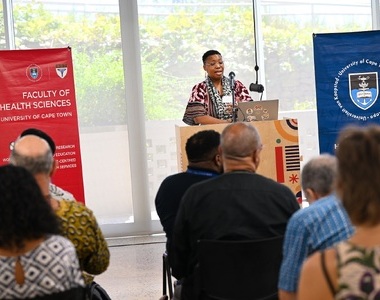Gratitude linked to better academic performance – new UCT study and pilot
28 June 2023 | Story Helen Swingler. Photo iStock. Voice Cwenga Koyana. Read time 5 min.
Practising gratitude, the art of being thankful, showing appreciation and being kind can change our perspective of the world for the better and may have lasting effects on our brains. A recently released study by University of Cape Town (UCT) researchers shows that gratitude is also directly related to improved academic performance among students.
The pioneering study explored the relationship between gratitude levels, well-being and academic performance and how these can be leveraged by South African students. It builds on UCT’s record of innovative research and has implications for throughput in South African educational institutions and in the policymaking arena.
The co-investigators were PhD candidate Sean Abrahams, a learning and innovation specialist (Residence Life Division) in the Department of Student Affairs, and Dr Philip Smith, a socio-behavioural scientist and senior lecturer at the Desmond Tutu HIV Centre in the Faculty of Health Sciences.
“As gratitude was associated with grade point average in this study, future research should test the effect of interventions designed to improve gratitude.”
It is one of the outcomes of a drive to build a “research enterprise” within the Department of Student Affairs, said Abrahams.
“Gratitude has long been recognised as a powerful emotion with numerous benefits,” Dr Smith said. “As gratitude was associated with grade point average in this study, future research should test the effect of interventions designed to improve gratitude on grade point average.”
An important outcome is that UCT will now launch a pilot intervention programme, designed for higher education students – a 21-day guided gratitude course to promote well-being. This will equip students with the tools and knowledge to cultivate gratitude and reap its benefits in various aspects of their lives, said Abrahams.
This resource is based on Professor Robert Emmons’ pioneering work on the psychology of gratitude, said Abrahams. Emmons is professor of psychology at the University of California, Davis, the founding editor-in-chief of The Journal of Positive Psychology and a scientific expert on gratitude.
The study
The study measured the association between gratitude and grade point average. The cross-sectional pilot study used the renowned Emmons' Gratitude Scale Tool, widely recognised for its effectiveness in measuring gratitude levels, said Abrahams.
The duo used a quantitative research design, using a sample of approximately 1 200 undergraduate students from UCT. Participants responded to an online invitation to complete a self-administered survey. Using the gratitude questionnaire originally validated by Emmons, students’ grade point average was compared with their gratitude scores. Statistical analyses examined the relationship between gratitude and academic performance while controlling for relevant demographic variables.
“Previous studies conducted in various contexts have demonstrated a correlation between gratitude and academic performance,” said Abrahams. “However, there is minimal research exploring this relationship within the specific higher education context of South Africa. Our study aims to fill this gap and contribute valuable insights to the field.”
Smith added, “Given the association between gratitude and grade point average, future research should focus on pilot interventions designed to enhance gratitude levels and their potential impact on academic performance.”
Pilot intervention launch
The programme will equip students with the tools and knowledge to cultivate gratitude and reap its benefits in various aspects of their lives.
“This resource has been specifically designed for higher education students, based on the pioneering work of Professor Emmons and the extensive research conducted on the psychology of gratitude,” said Abrahams.
Led by Smith and Abrahams, this initiative is supported by the Residence Academic Development Committee, which is chaired by Professor Elelwani Ramugondo, the deputy vice-chancellor for transformation, student affairs and social responsiveness.
Students and staff are encouraged to sign up for the self-reflective course, “Psychology of Gratitude: A 21-day guided intervention programme for university students to promote well-being”.
Besides unlocking benefits such as increased motivation, better mental health, reduced stress, improved relationships, and an enhanced university experience, students could win vouchers from popular spots like Bootlegger and Vida e Caffè.
“All it takes is three to five minutes a day,” said Abrahams.
 This work is licensed under a Creative Commons Attribution-NoDerivatives 4.0 International License.
This work is licensed under a Creative Commons Attribution-NoDerivatives 4.0 International License.
Please view the republishing articles page for more information.






























































































































































































































































































































































































































































